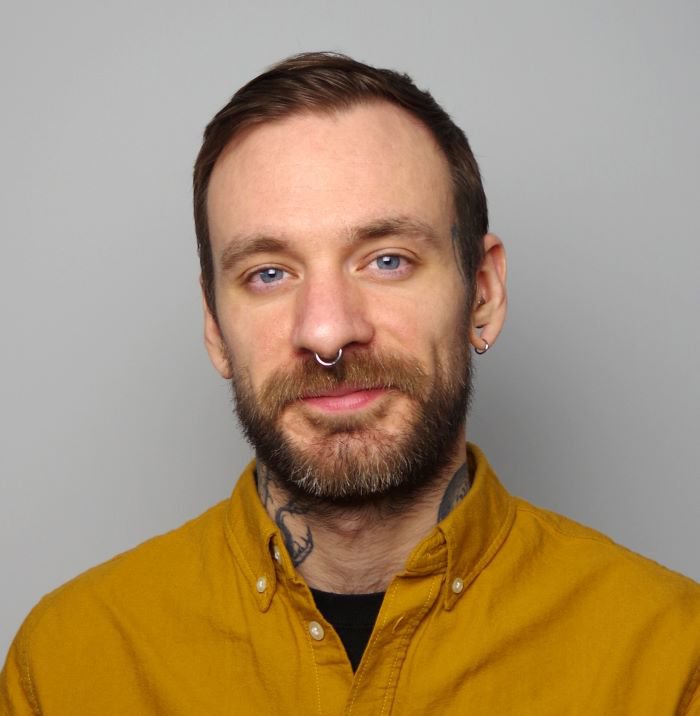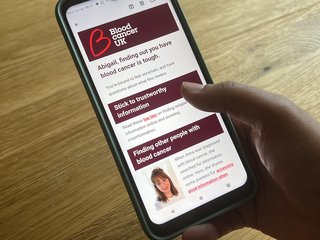Seeking support as a queer person with blood cancer
Stewart (they/them), diagnosed with chronic myeloid leukaemia (CML), talks about their experiences of finding and creating a support network.

Before I got the support I was looking for, I felt I was almost living a double life. One as part of the queer community and one as part of the cancer community. But neither seemed to fully understand the intersectionality of these two parts of me. I didn’t even know what I was missing until I set up my own charity OUTpatients (formerly Live Through This) to support people who are queer and have cancer. If you’re reading this and finding it hard to find the support you need, I want you to know that you deserve to feel supported and to not stop looking for a space where you feel validated, respected, and understood.
When I was diagnosed with chronic myeloid leukaemia (CML) in 2016, I had several questions that were specific to being queer and having blood cancer. I was looking for answers on sex and blood cancer treatment, and for a community of people who I could speak openly with about the impacts of blood cancer on being queer and vice versa. Honestly, I really struggled to find these things. I was given booklets aimed at heterosexual sex, that weren’t LGBTIQ inclusive and found I didn’t feel comfortable attending the very rigid views of “men’s groups” and “women’s groups” that were on offer.
For years, I stopped looking for support as it was frustrating not having inclusive information that was relevant to my experiences.
I am an outpatient, with a rare type of blood cancer and I’m also younger than most patients. All of this, especially with being queer, meant I felt isolated from the rest of the cancer community. I experienced so many barriers not only in accessing support, but in creating opportunities for other people to access support as a queer person. I really felt like I wasn’t what people expect of a blood cancer patient. The frustration and loneliness I had experienced finally pushed me to start my own charity OUTpatients dedicated to providing support opportunities for LGBTIQ people with cancer. It’s gender inclusive and a safe space to talk about the intersectional realities of being part of the LGBTIQ community and having cancer.
Cancer can affect anyone, but this isn’t always reflected in the support offered. I want to change this.
Before I created OUTpatients, I didn’t know what good support looked and felt like. I sort of was in this weird state of knowing I was missing out but not knowing what it felt like to chat to people who were in a similar position or had the same things. I struggled through on my own for so many years and I thought this was normal. Now I know that having support can make things so much easier.
OUTpatients provides a safe space for anyone who identifies as part of the queer spectrum and has had an experience of cancer. We provide opportunities for LGBTIQ people affected by cancer to meet and share their experiences. We recognise how sexual orientation and gender identity can affect the cancer experience and advocate for better understandings of this in healthcare professionals and patient communities.
What does good LGBTIQ support look like for people with cancer?
One of the things I notice at OUTpatients is the relief that washes over people when they come to a support session for the first time. The feeling of being able to come in, be themselves, and talk freely is palpable. Our community has its own set of values and culture which can sometimes be ignored in other support settings. There are conversations that general support groups and spaces may not be encouraging or supporting. Having different support options for different marginalised communities can be so validating and reassuring because we are all different and we all feel supported in different ways.
Good support is about being accessible and making people aware of their support options. It’s about being human too. So often we can get caught up in the medical aspects of specific cancers, but - from what I’ve seen in my charity - connecting people by who they are, not what they have, can be just as nourishing and supportive. Our lives are shaped by our multitude of experiences and identities and being queer is one of mine. Talking to other people who are queer, even if they have a different type of cancer, has been really valuable to me.
I want people to know…
- Don’t suffer in silence. Engage in support where you can, even if it’s not perfect. If it doesn’t feel good and if it’s not right for you, explore other avenues for support. This could look like talking openly with friends and family, speaking to your medical team, accessing psychological support, or joining a different support group.
- Support will look different to everyone. Some people will need regular ongoing support, others may need to check in when they really feel they need it. Support networks are as multifaceted as the people in them!
- It’s your right to share as much or as little as you want. You don’t owe anybody your story and if things are too uncomfortable to share, you don’t have to.
- It’s okay to grieve for the life you wanted, or the life you had before cancer.
- There is no perfect patient. You don’t have to feel positive all the time, you don’t have to be a certain way to be a good cancer patient.
- Connect with this new version of yourself and take the time to understand how you’re feeling about the changes and challenges it brings. It’s easy to dissociate when going through a difficult time so if you’ve noticed yourself doing this, come back to yourself and back into your own body.
No support service does everything for you. You need to build a patchwork of support around you, tailored to your needs.

Get a weekly support email from us
We'll send you clear and simple information, practical tips, and advice from other people with blood cancer, to help during the first few weeks and months after diagnosis.

